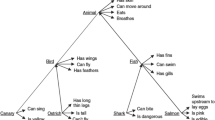Abstract
College students were trained to discriminate between sets of either related (R) or unrelated (U) words and were then given a recall test, followed by a recognition test. Results indicated that when equated for the amount of practice, R words were recalled more easily than they were recognized, but recognition was superior to recall for U words. The results are interpreted within a framework that distinguishes between different attributes of words and between storage and retrieval of memory traces.
Article PDF
Similar content being viewed by others
References
ANISFELD, M., & KNAPP, M. Association, synonymity, and directionality in false recognition. Journal of Experimental Psychology, 1968, 77, 171–179.
BATTIG, W. F., & MONTAGUE, W. E. Category norms for verbal items in 56 categories: A replication and extension of the Connecticut Category Norms. Journal of Experimental Psychology Monograph, 1969, 80, 1–46.
COHEN, B. H. Recall of categorized word lists. Journal of Experimetnal Psychology, 1963, 66, 227–234.
KENDLER, H. H., KENDLER, T. S., & MARKEN, R. S. Stimulus control and memory loss in reversal shift behavior of college students. Journal of Experimental Psychology, 1970, 83, 84–88.
KENDLER, H. H., & WARD, J. W. Memory loss following discrimination of conceptually related material. Journal of Experimental Psychology, 1971, 88, 435–436.
KENDLER, H. H., & WATSON, G. W. Economy of representation and reversal shift behavior. Journal of Verbal Learning & Verbal Behavior, 1969, 8, 129–135.
KINTSCH, W. Models for free recall and recognition. In D. A. Norman (Ed.), Models of human memory. New York: Academic Press, 1970.
MELTON, A. W. Implications of short-term memory for a general theory of memory. Journal of Verbal Learning & Verbal Behavior, 1963, 2, 1–21.
THORNDIKE, E. L., & LORGE, I. The teacher’s word book of 30,000 words. New York: Bureau of Publications, Teachers College, Columbia University, 1944
TULVING, E. Theoretical issues in free recall. In T. R. Dixon and D. L. Horton (Eds.) Verbal behavior and general behavior theory. Englewood Cliffs, N.J: Prentice-Hall, 1968.
UNDERWOOD, B. J. Attributes of memory. Psychological Review, 1969, 76, 559–573.
Author information
Authors and Affiliations
Additional information
This research was supported by National Science Foundation Grant GB-19323.
Rights and permissions
About this article
Cite this article
Kendler, H.H., Ward, J.W. Recognition and recall of related and unrelated words. Psychon Sci 28, 193–195 (1972). https://doi.org/10.3758/BF03328706
Published:
Issue Date:
DOI: https://doi.org/10.3758/BF03328706




